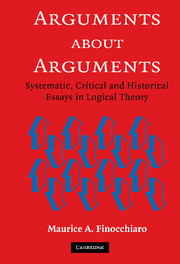Book contents
- Frontmatter
- Contents
- Preface and Acknowledgments
- Introduction : An Approach to a Branch of Logic
- Theorizing about reasoning and argument
- 1 Informal Logic and the Theory of Reasoning (1984)
- 2 An Historical Approach to the Study of Argumentation (1987)
- 3 Methodological Problems in Empirical Logic (1989)
- 4 Two Empirical Approaches to the Study of Reasoning (1994)
- 5 Critical Thinking, Critical Reasoning, and Methodological Reflection (1996)
- Fallacies and asymmetries
- Critiques
- Historical analyses
- Selected Bibliography
- Index
1 - Informal Logic and the Theory of Reasoning (1984)
from Theorizing about reasoning and argument
Published online by Cambridge University Press: 05 February 2015
- Frontmatter
- Contents
- Preface and Acknowledgments
- Introduction : An Approach to a Branch of Logic
- Theorizing about reasoning and argument
- 1 Informal Logic and the Theory of Reasoning (1984)
- 2 An Historical Approach to the Study of Argumentation (1987)
- 3 Methodological Problems in Empirical Logic (1989)
- 4 Two Empirical Approaches to the Study of Reasoning (1994)
- 5 Critical Thinking, Critical Reasoning, and Methodological Reflection (1996)
- Fallacies and asymmetries
- Critiques
- Historical analyses
- Selected Bibliography
- Index
Summary
A Definition of Informal Logic
Informal logic seems to be suffering from an image problem, a bad conscience, and an identity crisis. The image problem derives from the somewhat negative connotations of the term “informal,” which often conveys the impression that what we have here is a sloppy, nonserious approach to the study of logical problems. The bad conscience stems from conceiving the field as the theory of informal fallacies, and then taking the notion of “theory” to be such as to imply that a theory worthy of the name is necessarily formal; this would make the label “informal logic” a disguise for the formal theory of those fallacies different from the deductive and inductive ones. These two views are, respectively, a methodological interpretation of informal logic in terms of its alleged approach (“informality”), and a substantive definition in terms of its alleged subject matter (“informal fallacies”); now, since it is not easy to devise alternative interpretations as long as one keeps close to the terminological and verbal level, this may lead to the identity crisis of wondering what on earth informal logic is supposed to be. In this chapter I plan to bypass these difficulties by conceiving informal logic as the theory of reasoning. By theory of reasoning I mean the attempt to formulate, to test, to clarify, and to systematize concepts and principles for the interpretation, the evaluation, and the sound practice of reasoning.
- Type
- Chapter
- Information
- Arguments about ArgumentsSystematic, Critical, and Historical Essays In Logical Theory, pp. 21 - 33Publisher: Cambridge University PressPrint publication year: 2005



